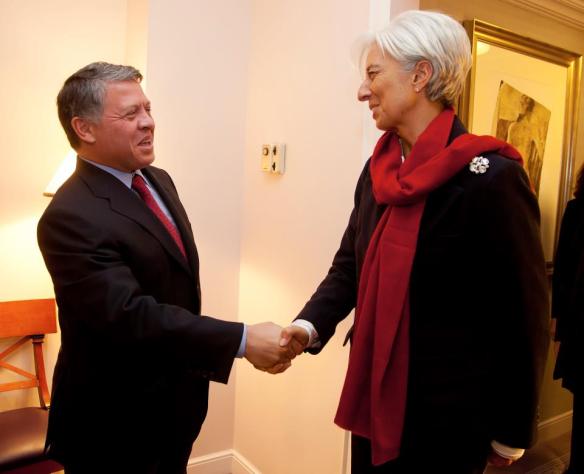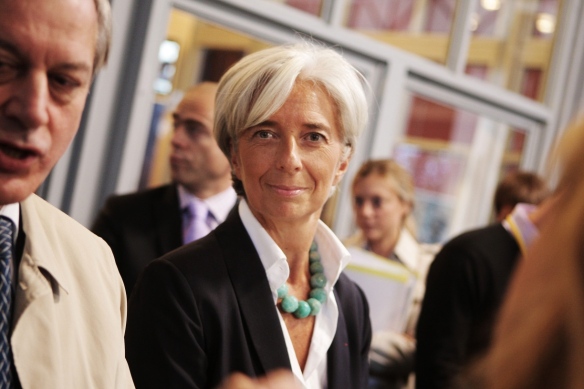 When French president Nicolas Sarkozy asked Christine Lagarde to join his cabinet in 2007, as Minister for Economy, Industry and Employment, she was already the first ever female Chairman of Chicago-based global law firm Baker & McKenzie. She is a respected antitrust and labour lawyer and today, as first female Managing Director of the Intenational Monetary Fund, she’s considered the 9th most powerful woman in the world by Forbes magazine (2011) and part of a very exclusive club of women that include Dilma Rousseff or Angela Merkel. She certainly looks the part, poised and elegant, calm and reassuring, reflexive and charming, her skin looking permanently tanned in contrast with her silver hair.
When French president Nicolas Sarkozy asked Christine Lagarde to join his cabinet in 2007, as Minister for Economy, Industry and Employment, she was already the first ever female Chairman of Chicago-based global law firm Baker & McKenzie. She is a respected antitrust and labour lawyer and today, as first female Managing Director of the Intenational Monetary Fund, she’s considered the 9th most powerful woman in the world by Forbes magazine (2011) and part of a very exclusive club of women that include Dilma Rousseff or Angela Merkel. She certainly looks the part, poised and elegant, calm and reassuring, reflexive and charming, her skin looking permanently tanned in contrast with her silver hair.
After Dominique Strauss-Kahn‘s very public downfall and resignation, as a result of a sex scandal -to the deep embarrassment of France; Christine Lagarde was immediately mentioned as a possible successor, and she received the support of Britain, India, the US, Russia, China and Germany. The Telegraph once described her as “the woman with no enemies”. From her first day on the job she had very complicated issues on the table, and her no-nonsense style was evident from the start and some statements she made angered many, especially in Greece. It was in an interview with British newspaper The Guardian, where she basically described Greeks as rampant tax dodgers and ruled out any breathing space from the austerity measures the country faced.
She is a hard-working woman, with a strong and elegant presence, firm in her convictions and obviously someone who speaks her mind. She is an outsider to politics in France, because she did not attend the prestigious École Nationale d’Administration, where most high-ranking French officials and politicians are groomed. She also never distinguished in math, being a Managing Director of the IMF who is more a lawyer than an economist. Being an outsider gives her a better perspective of things probably.
She was born Christine Madeleine Odette Lallouette, and her parents were both teachers. She studied in a girls’ school in Maryland, US; she got a degree in Law in Paris and a Master’s Degree in political science. She also worked as an intern at the United States Capitol, as congressional assistant to William Cohen. She has divorced twice, but no one really knows much about her two ex-husbands. They are not even mentioned in her official biography, which shows how fiercely she controls her public image. She has two sons, is a vegetarian and never drinks, although she did have a glass of champagne in an airport when she found out that had been appointed IMF boss.
Being French, there’s the issue of the elegance too. Unlike Hillary Clinton, who laughed at a similar question once, asking the interviewer if she’d ever ask that question to a man; Christine Lagarde has no problem talking about her wardrobe. In an interview with Vogue, she confessed that gets her clothes from three places mostly: Chanel, Ventilo and Austin Reed.
One of my favorite phrases by Christine Lagarde is that men, when left to themselves, make mess of things. Which is, well, as we all know, completely true. She is a strong believer in gender equality and has said that women are better than men when it comes to managing tasks and common sense. This is why she wants to hire many more women than men while she’s MD of the IMF.
She was always an overachiever. Many don’t know that as a teenager, Christine was a member of the French national synchronized swimming team, for example, or that she sang backing vocals in a ska band called “Les Messages Mixe” before getting married.
As Managing Director of the IMF, Christine Lagarde faces incredible challenges, like world economies on the brink of collapse, especially in Europe. She still has four years to go, but it will not be an easy ride for sure. Saving the Euro will be no easy task. The journey will be full of dangers and crises. And we need strong leaders in times of uncertainty.
Will Miss Lagarde be one of those leaders we so desperately need? Will this elegant and competent French woman be able to help fix the mess that we men created?












